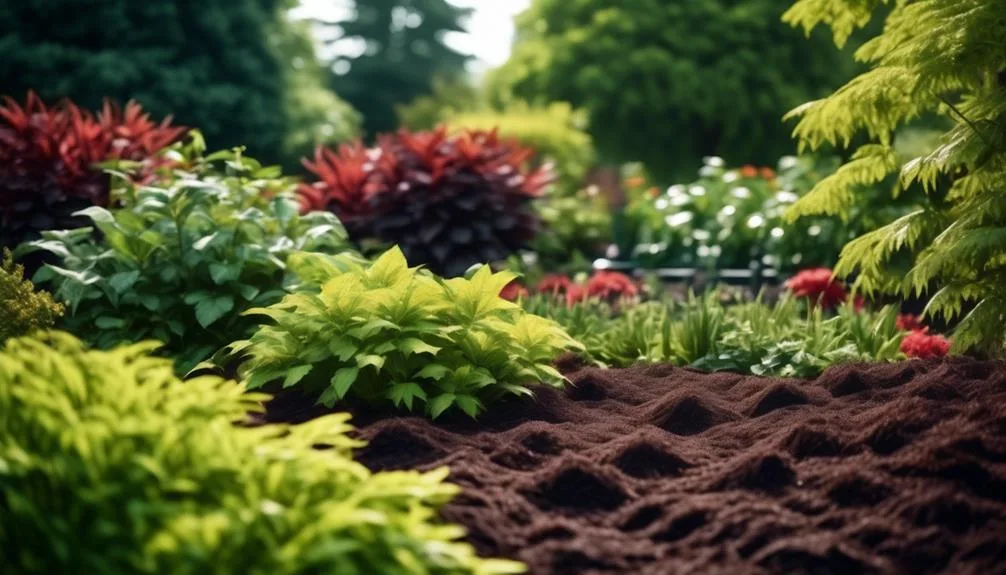Considering hickory tree mulch for your garden? Let's weigh the pros and cons.
Discover how it can impact soil health and plant growth.
Find out if hickory tree mulch could be the key to your garden's success.
Benefits of Using Hickory Tree Mulch
When using hickory tree mulch in your garden, you'll experience improved moisture retention and weed suppression. This natural mulch not only helps conserve water by reducing evaporation but also enriches the soil with essential nutrients.
As the mulch decomposes, it fosters microbial activity, promoting a healthy soil structure. The organic matter in hickory tree mulch serves as a food source for beneficial soil organisms, enhancing the overall soil ecosystem. This encourages earthworm activity, which in turn aids in soil aeration and nutrient cycling.
The gradual breakdown of hickory tree mulch also releases valuable nutrients into the soil, providing a sustainable source of nourishment for your plants. By incorporating hickory tree mulch into your garden, you can improve water retention, enhance nutrient levels, and promote a thriving soil environment.
How Hickory Tree Mulch Affects Soil Health
Enhancing soil health with hickory tree mulch involves fostering microbial activity and promoting a thriving soil ecosystem, resulting in improved moisture retention and nutrient levels. The table below summarizes how hickory tree mulch affects soil health.
| Effect on Soil Health | Impact |
|---|---|
| Enhanced microbial activity | Increases decomposition of organic matter, enriching soil fertility |
| Improved moisture retention | Reduces water evaporation, maintaining optimal soil moisture levels |
| Increased nutrient levels | Releases essential nutrients as it decomposes, enriching the soil |
Hickory tree mulch acts as a natural stimulant for soil microorganisms, enhancing their activity and promoting a healthy soil ecosystem. This process increases soil fertility and improves the overall quality of the soil, making it more conducive to plant growth.
Impact of Hickory Tree Mulch on Plant Growth
Using hickory tree mulch in your garden can significantly enhance plant growth. Here's how:
- Soil Nutrients
- Hickory tree mulch decomposes slowly, releasing nutrients such as nitrogen, potassium, and phosphorus into the soil as it breaks down. These nutrients are essential for healthy plant growth and development.
- Water Retention
- The mulch forms a protective layer over the soil, reducing water evaporation and preserving moisture levels. This ensures that plants have consistent access to water, even during dry periods, promoting better growth.
Using Hickory Tree Mulch for Weed Control
Considering the benefits of hickory tree mulch for plant growth, let's now explore its effectiveness in controlling weeds within your garden. Hickory tree mulch not only promotes plant health but also acts as a natural weed barrier. The mulch forms a dense layer that inhibits weed growth by blocking sunlight and preventing weed seeds from germinating. Additionally, as the mulch decomposes, it enriches the soil, creating an environment more conducive to your plants than to weeds. Furthermore, hickory tree mulch aids in moisture retention, which is beneficial for your plants but detrimental to many weed species. Below is a table summarizing the weed prevention and moisture retention benefits of using hickory tree mulch in your garden:
| Benefits | Description |
|---|---|
| Weed Prevention | Forms a barrier that inhibits weed growth by blocking sunlight and preventing seed germination |
| Moisture Retention | Helps retain soil moisture, creating an environment more favorable to plants than to weeds |
Best Practices for Applying Hickory Tree Mulch
To maximize the benefits of hickory tree mulch in your garden, follow these best practices for applying the mulch effectively:
- Depth: Apply the hickory tree mulch at a depth of 2-4 inches. This depth helps in improving drainage by allowing water to penetrate the soil effectively.
- Avoid Piling: When applying hickory tree mulch, avoid piling it against plant stems or tree trunks. This practice prevents compaction and allows for proper air circulation around the plants.
- Regular Maintenance: Regularly check the mulch layer and replenish it as needed. This ensures that the benefits of improved drainage and prevention of compaction are consistently provided to your garden.
Following these best practices won't only enhance the aesthetics of your garden but also contribute to healthier and more productive plants.
Conclusion
Incorporating hickory tree mulch into your garden offers a multitude of benefits. It enhances soil health, fosters plant growth, and aids in weed control.
By embracing this natural solution, you can elevate the well-being and aesthetics of your garden. Have you considered the impact hickory tree mulch could have on your gardening endeavors?
Give it a try and witness the transformation.

My interest in trees started when I first saw the giant sequoias in Yosemite.
I was a teenager then, and I remember thinking, “I need to learn more about this.”
That moment stuck with me.
A few years later, I went on to study forestry at Michigan Tech.
Since graduating, I’ve worked in a mix of hands-on tree care and community education.
I’ve spent over ten years helping people understand how to plant, maintain, and protect the trees in their neighborhoods.
I don’t see trees as just part of the landscape.
They are living things that make a real difference in our daily lives.
